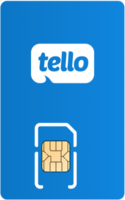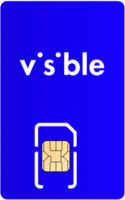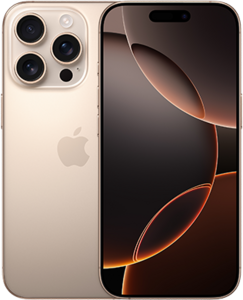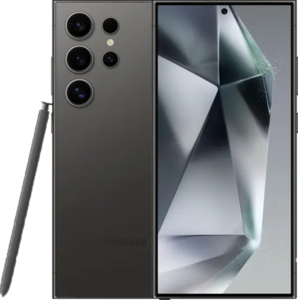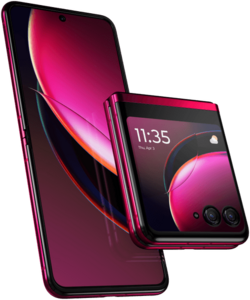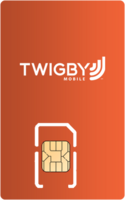
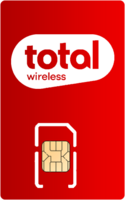

Disclaimer: MoneySavingPro is a free price comparison service but we do not provide service directly. We do our best to keep all the information up to date but there may be some discrepancies between the price you pay.
| 1 year | 2 years | 3 years | |
|---|---|---|---|
| Big Wireless | $900 | $1,800 | $2,700 |
| Alternative | $300 | $600 | $900 |
| You save | $600 | $1,200 | $1,800 |





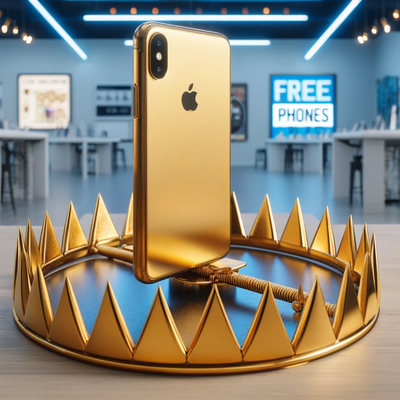
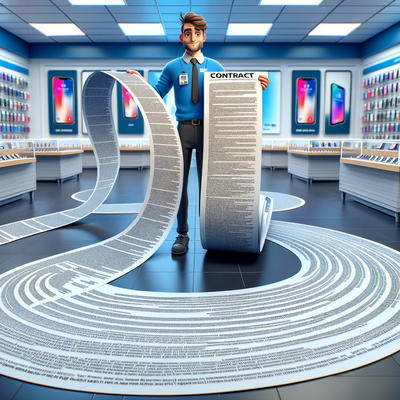


Tello offers the best SIM card for low data users
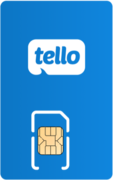
Tello 2GB SIM card for $10/mo
- T-Mobile 5G & 4G LTE network
- Unlimited talk and text with 2GB data
- Instant online activation
Looking for an easy way to cut your phone bill without losing reliable service? Tello offers one of the best low-cost options on T-Mobile's network.
You get unlimited talk and text, plus free international calls to 60+ countries (including Canada and Mexico). Tello's flexible approach allows you to build your own plan, selecting just the right amount of data, talk, and text to match your needs.
Get mobile hotspot use with every plan, but the unlimited plan is capped at 5GB. There are no discounts for multiple lines, but at these prices, bundling isn't necessary.
Getting started is seamless with eSIM. The activation takes just a few taps. Or you can order a physical SIM if preferred.
I also looked into other options. Ultra Mobile is a great choice for international calls but costs more for similar data. Metro by T-Mobile requires in-store activation and is more expensive. Boost Mobile has attractive pricing, but hidden fees and inconsistent service take away its appeal.
For an affordable, flexible, and commitment-free phone plan, Tello remains the top pick.
- Custom plans – Only pay for what you need, with no forced extras.
- Simple, transparent pricing – No contracts, no hidden fees.
- Easy setup – eSIM activation in minutes or a shipped SIM card.
Visible offers the best value unlimited SIM card

Visible unlimited SIM card for $25/mo
- Verizon 5G & 4G LTE network
- Unlimited talk, text and data
- Instant online activation
Tired of complicated wireless plans? Visible keeps it simple with just two unlimited options, both with no contracts, no extra fees, and no hassle.
For $25/month, you get unlimited talk, text, and data, plus mobile hotspot access with speeds of 5–10 Mbps. If you need faster speeds and premium data, the Visible+ plan gives you 50GB of priority data and Verizon's 5G Ultra Wideband access.
International perks make Visible+ even better. It includes free international calling to 30+ countries and texting to over 200 destinations. Plus, eSIM activation lets you start service in just minutes.
Although multi-line discounts aren't available, Visible's low individual pricing ensures great value for single users. Just keep in mind that customer support is online-only.
Compared to Tracfone, Xfinity Mobile, and Spectrum Mobile, Visible stands out. Tracfone is cheaper but restricts data speeds. Xfinity Mobile and Spectrum Mobile have good pricing, but you must be an internet customer to sign up.
For no-fuss unlimited service with clear pricing, Visible is the best pick.
- Unlimited plans, no surprises – Simple, all-in pricing with no hidden fees.
- Built-in extras – Mobile hotspot included, plus free international calling & texting with Visible+.
- Instant activation – eSIM lets you switch in minutes, or order a SIM card.
Total Wireless offers the best SIM card with Verizon coverage
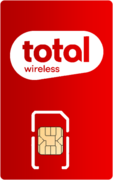
Total Wireless unlimited SIM card for $50/mo
- Verizon 5G & 4G LTE network
- Unlimited talk, text and data
- Instant online activation
Total Wireless keeps wireless service simple and affordable, offering no-contract plans with Verizon's coverage.
With unlimited talk and text, generous high-speed data allowances, and hotspot access up to 15GB, you get everything you need at a lower cost.
International features are built in with select plans include free calling to 85+ destinations and roaming in Canada and Mexico.
You can manage your plan easily online, with no activation fees, no contracts, and no hassle.
I compared other budget-friendly carriers on Verizon's network. Tracfone's pay-as-you-go plans limit high-speed data. Xfinity Mobile and Spectrum Mobile provide solid deals, but require home internet service.
For a cost-effective plan with Verizon's coverage and useful extras, Total Wireless is a smart choice.
- Verizon's coverage, lower price – Reliable service without the premium cost.
- Great extras included – Hotspot access up to 15GB on certain plans, plus free international calling & roaming.
- No long-term commitments – Manage your plan online with total flexibility.
Tello offers the best SIM card with T-Mobile coverage

Tello unlimited SIM card for $25/mo
- T-Mobile 5G & 4G LTE network
- Unlimited talk, text and data
- Instant online activation
Tello is all about giving you affordable wireless service without the headaches of big carrier contracts.
Every plan includes free international calling to 60+ countries, including Canada and Mexico, along with flexible data options tailored to your needs.
With Tello, you build your own plan-picking just the right amount of data, talk, and text. That means no paying for features you don't use. Every plan includes mobile hotspot access, with a 5GB limit on unlimited plans, and while multi-line discounts aren't available, individual pricing is so competitive that bundling isn't necessary.
Switching is fast and hassle-free-if your phone supports eSIM, you can activate your plan in just a few taps. If not, Tello will send you a physical SIM card for easy installation.
I looked at other options, including Metro by T-Mobile, Ultra Mobile, and Boost Mobile. Metro by T-Mobile requires in-store activation and charges more for similar plans. Ultra Mobile offers good international calling perks but costs more. Boost Mobile has attractive pricing but taxes and fees can vary and customer support is inconsistent.
For low-cost, no-commitment service with full flexibility, Tello is a standout choice.
- Personalized plans – Create a plan with just the right amount of talk, text, and data-no wasted money on extras.
- No hidden fees, no contracts – Pay month to month with transparent pricing and no surprise charges.
- Seamless activation – eSIM allows for instant setup, or you can get a SIM card shipped and activate at your convenience.
Red Pocket offers the best SIM card with AT&T coverage
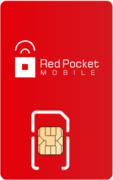
Red Pocket unlimited SIM card for $30/mo
- AT&T 5G & 4G LTE network
- Unlimited talk, text and data
- Instant online activation
If you're looking for an unlimited plan for the whole family, Red Pocket Mobile offers major savings on AT&T's network.
You'll get a $20 discount per extra line, helping families cut costs while still enjoying premium network coverage. Although there's a small setup fee, the overall savings make it worth the switch.
Plans come with unlimited talk and text, no hidden fees, and up to 30GB of high-speed data, plus hotspot access for added flexibility.
For international users, Red Pocket Mobile includes free calls to 80+ countries and free roaming in Mexico and Canada, all at no extra cost. eSIM users also get a 7-day money-back guarantee, allowing them to try the service risk-free.
I reviewed other AT&T-powered budget carriers, including Cricket Wireless, which costs more despite being AT&T's own prepaid brand, H2O Wireless, which has international perks but isn't as competitively priced, and Good2Go Mobile, which offers lower prices but limited plan choices.
For an affordable unlimited plan with premium features and great family savings, Red Pocket Mobile is a top choice.
- Multi-line savings – Save $20 per extra line and lower your family's phone bill.
- Built-in global perks – Free calls to 80+ countries and free roaming in Mexico & Canada.
- No contracts, no surprises – Clear pricing with a 7-day eSIM refund policy.
How to choose the best 5G SIM card plan
Which network do you prefer?
Low-cost carriers are powered by the same 5G and 4G LTE networks as the big 3. According to a 5G Experience Report (2023) by Opensignal, T-Mobile has the most extensive 5G coverage in the United States. If you have a preference for a specific network, you can find an MVNO that operates on that network. To discover the best cell phone service in your area, make sure to use our coverage checker.
How much data do you need?
Do you really need a prepaid SIM card for unlimited data? The big 3 wireless companies want you to believe so, but in reality, the average monthly cellular data consumption is around 10GB. Because if you spend most of your time at home or work on Wi-Fi, it's likely your cellular data usage will be much lower. You can pick a plan with enough data to fit your needs with cheap cell phone providers, meaning if you use less, you can pay less. But if you do choose an unlimited data SIM card, be aware that high-speed data is normally capped.
Is mobile hotspot data included?
Many MVNOs permit the usage of hotspot data. However, they impose restrictions on the quantity of data that can be used through tethering. The specific limit varies depending on the carrier and plan that you select. Additionally, some low-cost carriers provide exclusive data only SIM cards designed specifically for iPads, tablets, and mobile hotspots.
What's the monthly cost?
While an unlimited data SIM card with the big 3 wireless costs around $75-90 per month, the best MVNOs offer budget-friendly SIM cards, ranging from $5-35 per month without compromising coverage or data speeds. Watch out for hidden fees & taxes; some providers include these in the price, and others, such as Verizon and AT&T, don't.
How many lines do you need?
With big wireless, you only get the low advertised price if you buy four lines. With low-cost carriers, the price you see is what you pay, even for one line. Some MVNOs also offer further discounts for multi-line plans.
Can I bring my own phone or buy a new device?
While big wireless prioritizes keeping their customers in a perpetual cycle of phone upgrades, MVNOs advocate for bringing your own device. This empowers you to regain control and only switch phones when it's convenient for you. In the event that you do decide to buy a new phone, most MVNOs provide the option for 0% financing spread across 1-2 years.
Are there any promotions?
Promotions from big wireless can seem great at first. But once you read the fine print, it often leads to buying things you don't need and committing to 3-year phone contracts. Most MVNOs offer short-term introductory discounts for new customers, and their pricing is much clearer.
Are there any perks?
The big 3 wireless plans normally come with "complimentary" TV subscriptions, but these often become paid subscriptions that are automatically included on your bill after a few months. Although some budget-friendly carriers like US Mobile do provide plan choices with free subscription services, we generally advise keeping these subscriptions separate to avoid paying for unnecessary months of service.
What international travel features are available?
Most MVNOs offer free international calls to many countries. But when you're traveling abroad, there are different features you'll need, for example, roaming. If this is important to you, you can find a variety of carriers offering SIM cards for international travel.
Do they have parental controls?
Many MVNO carriers offer parental control features that enable parents to monitor their children's phone usage and data consumption. With parental controls, you can set data limits, restrict access to certain apps or websites, and even track your child's location. Some AT&T MVNOs offer these features as part of their standard plans, or you'll find this feature on your cell phone.
What are the SIM card sizes?
The SIM card you need will depend on your device. Most smart devices now use a nano-SIM or eSIM, but some older devices may need a micro-SIM or a standard SIM.
Check out our comparison of the best prepaid SIM cards to ensure you find the best deal.
Find the best 5G phone service in your area
Compare the cheapest 5G SIM card plans
| Carrier | Network | Data | Price |
|---|---|---|---|
| Tello 2GB SIM card | T-Mobile 5G/4G Coverage | 2GB | $10/mo |
| Visible Unlimited SIM card | Verizon 5G/4G Coverage | Unltd | $25/mo |
| Total Wireless Unlimited SIM card | Verizon 5G/4G Coverage | Unltd | $25/mo |
| Tello Unlimited SIM card | T-Mobile 5G/4G Coverage | Unltd | $25/mo |
| Red Pocket Unlimited SIM card | AT&T 5G/4G Coverage | Unltd | $30/mo |
SIM cards for international travelers
In the quest for affordable and flexible communication, especially when traveling, prepaid SIM cards have become a pivotal part of helping to stay connected. For travelers jetting from the USA to Europe and other various countries, the GSM technology underlying most prepaid SIM cards ensures phone compatibility, catering to both iPhone, Android, and other smartphones.
Whether you're looking to buy a new SIM card on arrival or opt for a travel SIM card, either is a great option. Also, if your phone is compatible, an eSIM can make this process even easier.
However, your current carrier may offer international plans, but they usually come with a hefty price tag. The best option can be getting a local SIM card, which presents a cost-effective option, often providing a substantial GB of data, free mobile hotspot data, and local call minutes, which are invaluable for internet access to navigate via Google Maps or stay connected through WhatsApp and Skype.
A new SIM card can offer an ideal plan tailored for each destination and guarantee the best rates.
SIM cards
- Best Prepaid SIM Card
- Best Cheap SIM Card Plans
- 10 Best Prepaid 5G SIM Cards
- 10 Best Pay as You Go SIM Cards
- Best SIM Card for International Travel
- 10 Best Prepaid SIM Cards for USA Travel
- 10 Best Prepaid SIM Cards for iPhones
- Best Prepaid SIM Card for Hotspots
- Best Prepaid SIM Card for iPads
- Best Prepaid SIM Card for Tablets
How I choose the best carriers and plans
To select the best carriers and plans, I evaluated over 30 different carriers.
I rate carriers in five categories, with a star rating from 1-5, with 5 stars being the best. I then calculate the overall star rating using the five categories:
- Value for money: I compare carriers based on price, features, benefits, and promotions. It's not just about the lowest price but getting the most bang for your buck.
- Coverage: I look at network 5G and 4G LTE coverage across the US. I use coverage maps to determine service availability and data speeds in urban, suburban, and rural locations.
- Customer experience: I take into account items such as current user experience, website and app usability, ease of switching, and customer service in terms of availability, channels, and satisfaction ratings.
- Transparency: I assess whether carrier pricing is clear and straightforward. I examine the fine print to check for hidden fees, confusing terms or conditions, and misleading offers to ensure upfront, honest prices and advertising.
- Range of choice: I evaluate the diversity of plan options to determine if they fit the individual needs of all customers.
Read more about our carrier ratings methodology and our editorial process.
I regularly update the content so that we're always recommending the latest and best value plans and do my best to ensure the information is accurate.
A low-cost carrier uses the same towers and coverage as major networks like Verizon, T-Mobile, and AT&T. The difference is that low-cost carriers offer more affordable plans with fewer hidden fees because they don’t have the same overhead costs as the big guys.
Low-cost carriers can keep prices lower because they don’t own the network infrastructure. They pay the major carriers for network access, which allows them to pass the savings on to you.
Yes. Most low-cost carriers offer flexible plans that allow you to adjust your data, talk, or text limits to suit your needs, as you are not tied into a contract. You can change your plan or cancel anytime.
You can bring your own unlocked phone to most low-cost carriers or purchase one directly from the carrier. Many low-cost carriers offer popular models, and their network compatibility is usually no issue.
Yes, switching to a low-cost carrier is simple. You can sign up online, bring your own phone, and port your number easily. The process is quick and straightforward, and customer support is available to assist with any issues.
No! Most low-cost carriers offer prepaid, no-contract plans, meaning you're not tied down to long-term commitments. You can switch whenever you like without paying hefty termination fees.
Most low-cost carriers offer easy payment options, including online billing, autopay, or prepaid options. Many also offer discounts for paying upfront or signing up for autopay.
Yes! Some low-cost carriers offer family plans or multi-line discounts. But just by signing up the whole family to a low-cost carrier without the discount could save you up to $600 a year, per line.
Yes, while the big 3 only offer unlimited data plans, most people actually don’t need these. You can choose a plan with a data limit that suits your usage to save even more money or an unlimited data plan. It's up to you.
Depending on the plan, normally, your speeds will be slowed until your next billing cycle, rarely do any charge for overage use. However, some low-cost carriers provide options for purchasing additional data at a reasonable cost.
No, low-cost carriers use the same towers as the big networks, so you’ll have the same signal strength and coverage as with Verizon, T-Mobile, or AT&T.
Yes, all low-cost carriers now offer 5G service, as they use the same networks as the big 3. You will need a compatible phone and plan, but 5G is increasingly available across low-cost carriers.
You may experience slower speeds during peak times if your low-cost carrier deprioritizes data. However, outside of busy periods, you should enjoy the same fast speeds as you would with major carriers. Your speeds will depend on the network’s traffic at any given moment.
No, low-cost carriers provide coverage in rural and remote areas, just like major networks. The coverage is essentially the same, as they all use the same towers and infrastructure.
While customer service experiences can vary, many low-cost carriers offer excellent customer support. They tend to focus on customer satisfaction and transparency without the frustration of endless hold times or high-pressure sales tactics often seen with the big carriers.
Yes, most low-cost carriers offer reliable customer support. It varies by carrier but you’ll find they offer online support or phone assistance.
Most low-cost carriers don’t have physical stores, so in-person support may be limited. However, most low-cost carriers offer strong online support or call center assistance to resolve issues remotely.
While low-cost carriers may not offer as many in-store support options as big carriers, they generally provide reliable and helpful customer support through phone and online channels. Their support tends to be more personal and straightforward compared to larger, more corporate carriers.
Customer support can assist with a wide range of issues, including billing inquiries, plan changes, technical issues, device troubleshooting, network connectivity problems, and account management.
Yes, you can keep both your current phone and phone number when switching to a low-cost carrier. The process is easy, and most low-cost carriers offer tools to help you through the transfer.
Yes, it’s quick and easy! Low-cost carriers typically allow you to sign up online, bring your own phone, and transfer your number. The process is simple, and customer support is available to guide you if needed.
In most cases, there should be minimal downtime during the switch. The porting process usually takes a few hours to complete, but you can often continue using your current service until the transfer is finalized. Make sure to complete the switch during business hours for faster processing.
You can check if your phone is compatible by looking up the low-cost carrier’s compatibility list on their website or using your IMEI number.
Many low-cost carriers offer device financing or discounts for purchasing a new phone through them. However, you're also free to bring your own unlocked phone giving you flexibility.
Some low-cost carriers offer international calling and roaming options, but it's important to check with the specific carrier for details. Some carriers may offer affordable add-ons for international calls and data.
Many low-cost carriers offer affordable international calling plans or add-ons to help keep costs down, but the exact rates can vary.
Yes, if your low-cost carrier supports international roaming, you can use your international calling plan while abroad. However, be sure to check roaming rates and coverage before you travel to avoid unexpected costs.
Yes, many low-cost carriers allow you to make international calls over Wi-Fi using apps like WhatsApp, Skype, or other VoIP services. This can be a cost-effective way to call internationally, as it doesn’t count toward your carrier's voice minutes or incur additional charges.









